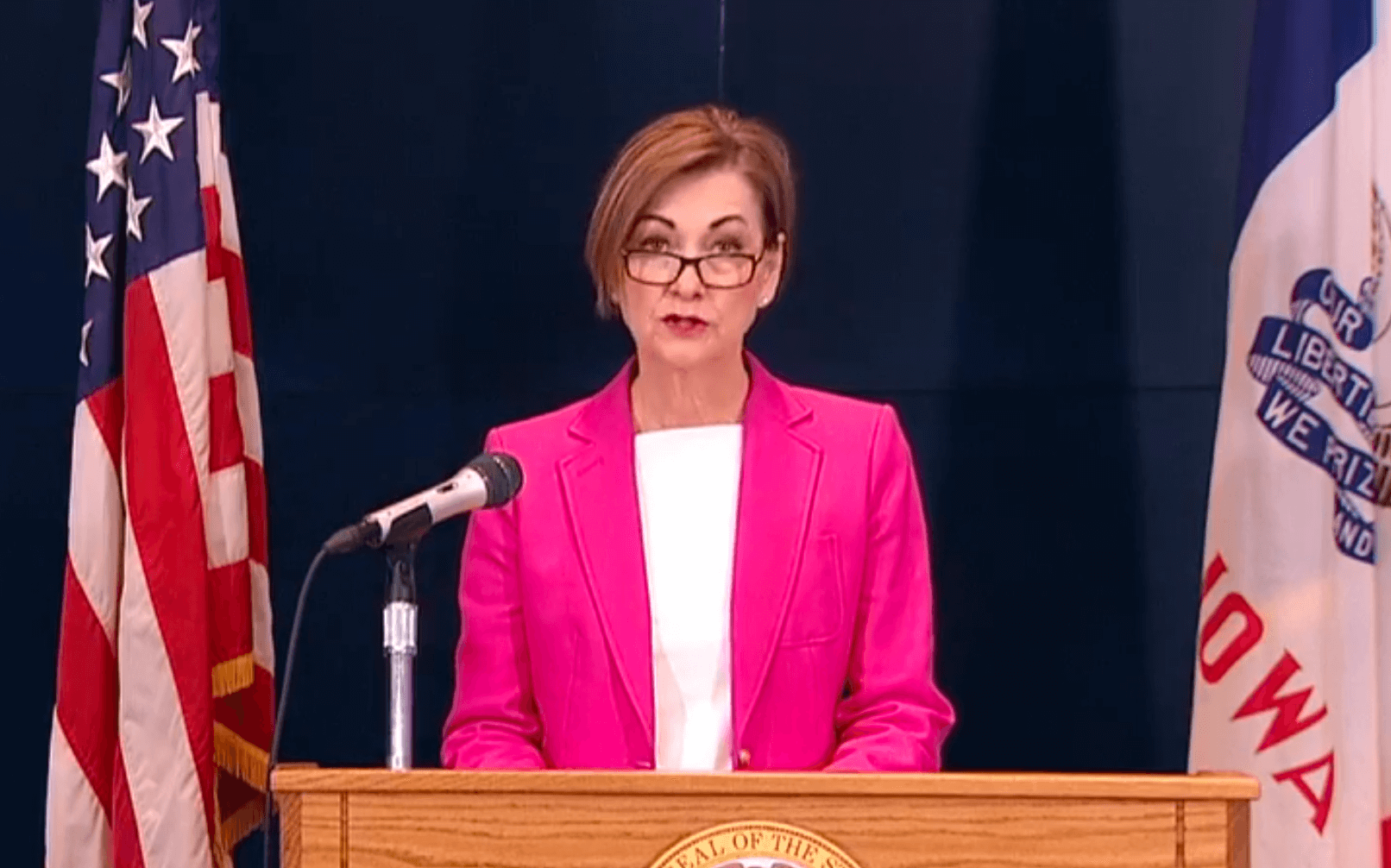
Why did Gov. Kim Reynolds believe that abortion was an “elective” or “nonessential” medical procedure and added in her temporary ban this Thursday? Ask someone else, she suggested during a follow-up question at her press conference this afternoon.
“We kept it broad, I didn’t specifically address everybody,” Reynolds said of her order signed three days ago halting a wide range of medical procedures until at least April 14. “If they have a question, you know, does a kidney stone apply? There are those kinds of questions that are happening with everything … With every one of the directives that we’ve made or every one of the orders that we’ve put in place, there are questions. So, I guess if they have questions, the Board of Medicine would be the enforcement or the oversight for this. So, as people have questions, that’s where they can go and can maybe get the answers that they’re looking for.”
The first question at her COVID-19 press conference today was focused on her office’s confirmation from Friday that surgical abortions were included in her Thursday order. The decision angered Iowa’s reproductive rights community, believing it to be a politically-motivated move that took advantage of the health crisis to enact by emergency order what Iowa Republicans have failed to do legislatively for years.
It followed the moves of states like Ohio, Texas and Mississippi (and some other countries), who have also halted most abortions in their moves to suspend nonessential medical procedures.
[inline-ad id=”0″]
But the American College of Obstetricians and Gynecologists put out a statement a week ago that encouraged states to not include abortion services in such orders.
“To the extent that hospital systems or ambulatory surgical facilities are categorizing procedures that can be delayed during the COVID-19 pandemic, abortion should not be categorized as such a procedure,” they wrote. “Abortion is an essential component of comprehensive health care. It is also a time-sensitive service for which a delay of several weeks, or in some cases days, may increase the risks or potentially make it completely inaccessible. The consequences of being unable to obtain an abortion profoundly impact a person’s life, health, and well-being.”
Reynolds quickly dismissed the idea that her own personal ideology on the matter (she and legislative Republicans have tried repeatedly in recent years to significantly restrict abortion rights in Iowa), pointing instead to a concern over the supply of personal protective equipment.
“The decisions that I have made have been made in the vein of really helping us strategically use our PPE stockpile that we have. That has been an issue from the very beginning of this,” Reynolds said, referencing the health care professionals on the front lines of the pandemic.
[inline-ad id=”1″]
The Governor then appeared to have a prepared comment ready for the question, written in a way to push back on any accusations, but not one that further explained why abortion was classified as “nonessential.”
“It’s the same thing I’ve applied to everything,” Reynolds said. “For instance, I didn’t close down bars and restaurants to go after the hospitality sector … We didn’t make the decision lightly to recommend shutting schools for four weeks. We did that, again, because we wanted to bend the curve and so we didn’t overwhelm health care systems and really help spread this out so we could, again, preserve the Personal Protective Equipment. I didn’t suspend churches and gatherings of more than ten to go after our faith community. I did that, again, as part of our metric and strategy in helping to protect our most vulnerable … Everyone is making sacrifices, everyone, so this is a decision that we are making on a daily basis.”
As one extra point, Reynolds noted that they wanted to reduce the usage of anesthesia machines for other medical procedures, as it’s possible those could be converted to makeshift ventilators.
In other news at the press conference, Sarah Reisetter, deputy director of IDPH, said that their current projections show Iowa peaking in in COVID-19 cases in two or three weeks, though she noted that numbers are constantly changing.
by Pat Rynard
Posted 3/29/20
Politics

Biden marks Earth Day by announcing $7 billion in solar grants
The Biden administration on Monday announced the recipients of its Solar For All Program, a $7 billion climate program that aims to lower energy...

6 terrifying things that could happen if the Comstock Act is used to target abortion
Does 1873 sound like a really, really long time ago? Well, that’s because it is—but if Republicans and far-right anti-abortion activists have their...
Local News

No more Kum & Go? New owner Maverik of Utah retiring famous brand
Will Kum & Go have come and gone by next year? One new report claims that's the plan by the store's new owners. The Iowa-based convenience store...

Here’s a recap of the biggest headlines Iowa celebs made In 2023
For these famous Iowans, 2023 was a year of controversy, career highlights, and full-circle moments. Here’s how 2023 went for the following Iowans:...





